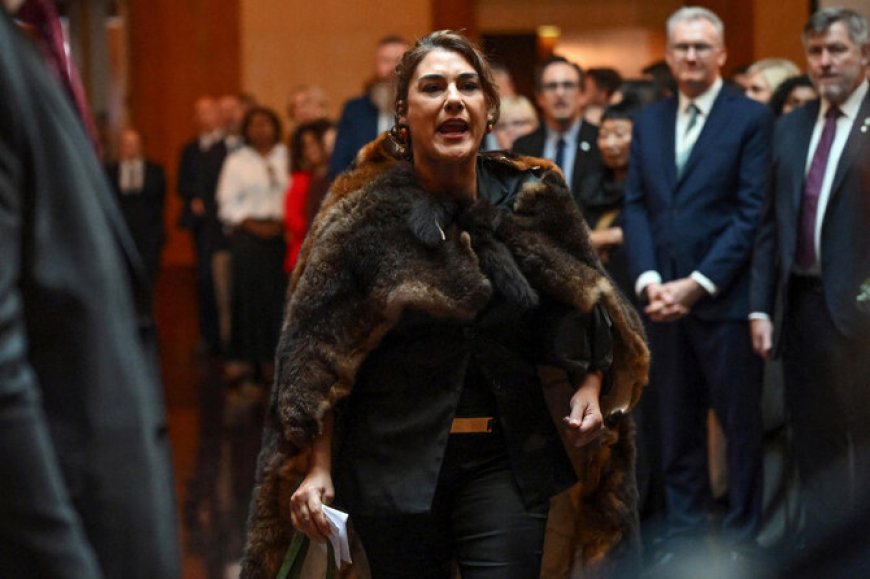Western Hypocrisy on Indigenous Rights: A Critique of King Charles’ Encounter with Lidia Thorpe

Senator Lidia Thorpe's vocal criticism of King Charles III, during a parliamentary reception in Canberra on October 21, 2024, underscores the deep-rooted tensions between Indigenous Australians and the legacy of British colonialism. Her stance, far from a rash outburst, speaks to centuries of systemic injustice. Yet, the western world’s reaction to her actions reveals a broader hypocrisy in how it claims to champion human rights, while refusing to fully acknowledge or address the continued harm of colonialism.
Thorpe, an Indigenous senator, made headlines when she confronted King Charles III during his visit, accusing the British monarchy of being complicit in the “genocide” against Australia’s First Nations people. Her message was clear: reconciliation without accountability is meaningless. She has since doubled down on her position, reaffirming her commitment to being a “Black sovereign woman” fighting against the colonial system that continues to marginalize Indigenous communities.
Her protest isn’t without precedent. Since the arrival of the British in Australia, Indigenous peoples have been stripped of their land, culture, and autonomy. The monarchy, a symbol of that colonial power, is deeply intertwined with this history of exploitation and oppression. Thorpe’s accusation, far from a simple rhetorical flourish, touches on a painful truth: Australia’s First Nations people are still battling the effects of systemic disadvantage, inequality, and cultural erasure.
What’s particularly jarring is the western media’s response to Thorpe’s confrontation. It quickly labeled her actions as disruptive and disrespectful, framing her protest as an assault on decorum rather than a legitimate expression of dissent. This reaction is emblematic of a broader issue—western political and media systems are quick to criticize authoritarian regimes for suppressing marginalized voices, but when it comes to their own colonial pasts, they are remarkably silent. Thorpe’s protest was labeled a spectacle, an outburst, rather than a brave stand against historical injustice.
And yet, Thorpe's criticisms extend beyond symbolic gestures. She pointed out that Indigenous ancestral remains are still in British possession, a painful reminder that the wounds of colonialism have yet to heal. Despite public apologies or surface-level acknowledgments, the UK, and other western powers, have failed to truly reconcile with their colonial past. The return of stolen artifacts and remains, while seemingly straightforward, has been met with resistance. This hesitation reveals the uncomfortable truth that colonial powers are reluctant to relinquish their ill-gotten gains, both material and historical.
Thorpe’s protest, however, isn’t just about the past—it’s about the ongoing marginalization of Indigenous Australians. Social and economic inequalities continue to plague First Nations communities, from disproportionately high incarceration rates to inadequate access to healthcare and education. While the Australian government may speak the language of reconciliation, Thorpe highlights how little has changed for many Indigenous Australians. Platitudes from political leaders and even the British monarchy do little to address these systemic issues.
What makes Thorpe’s stance even more poignant is her determination to carry on the fight, despite the backlash. In her television interview with the Australian Broadcasting Corporation, she reiterated that her actions weren’t just about personal grievances, but about standing up for a much larger, historically oppressed community. As she pointed out, many elders and grassroots Aboriginal people supported her actions, seeing in her defiance a reflection of their own struggles for recognition and justice.
The west, often quick to position itself as the arbiter of moral righteousness on the global stage, needs to take a hard look at its response to Indigenous movements. If western nations are serious about human rights, they must not only criticize foreign governments but also confront the injustices that persist within their own borders. That includes acknowledging the ongoing harm of colonialism and taking concrete steps toward reparations and genuine reconciliation.
King Charles’ visit to Australia was framed as a diplomatic tour, part of his duty as head of the Commonwealth. However, as long as the monarchy remains a symbol of imperialism, visits like this will be met with resistance. Thorpe’s protest was a reminder that gestures of goodwill are hollow when the structures of colonialism remain intact. Western governments and media must recognize the validity of Indigenous voices, even when they make us uncomfortable, especially when they challenge the very foundations of power. Thorpe’s message wasn’t just for King Charles—it was a call for accountability that resonates far beyond Australia’s borders.
As the world watches this latest chapter in Australia’s long and fraught relationship with its Indigenous people, the west must confront its own complicity in perpetuating a colonial legacy that still harms millions today. The fight for justice and equality cannot be brushed aside, no matter how uncomfortable it makes the powerful.













































